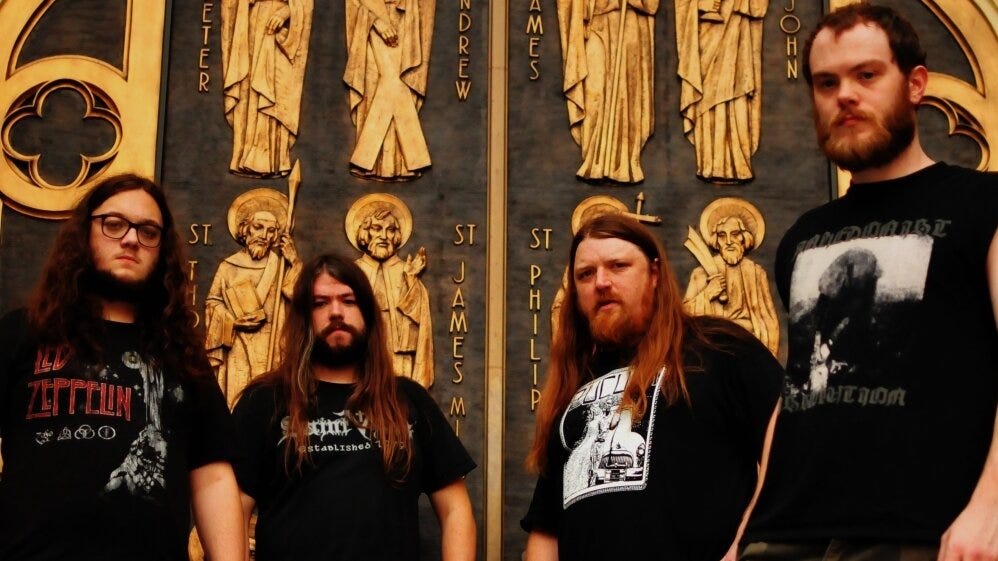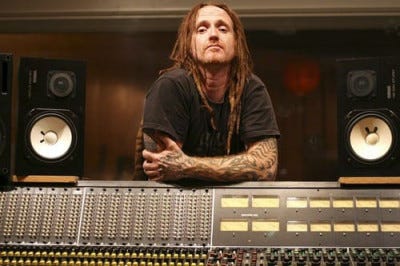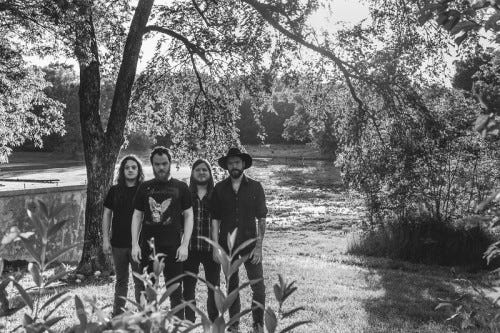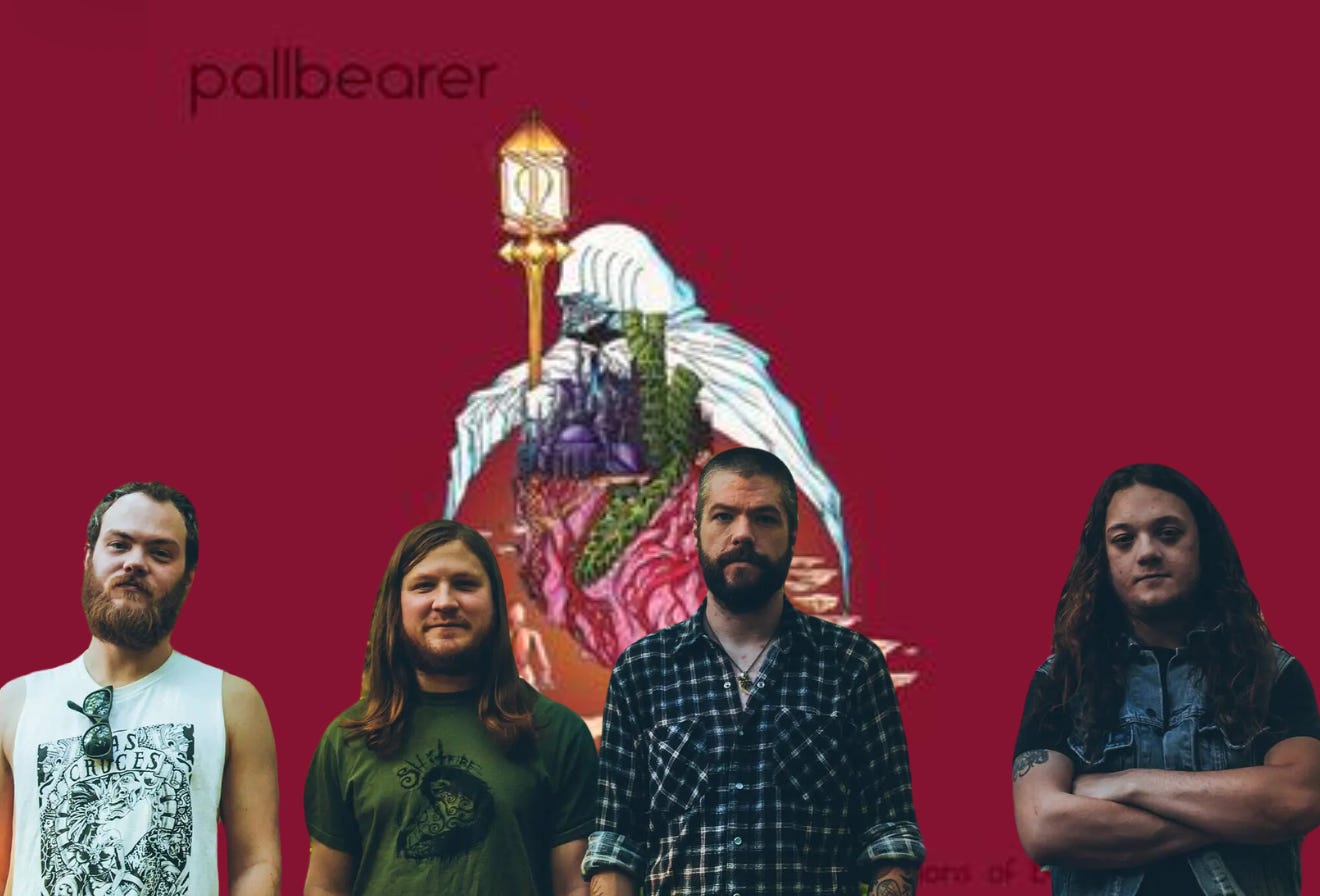Modern Metal Masterpiece: How Pallbearer's 'Foundations of Burden' Brought Doom Metal to the Masses
With their 2014 sophomore album, the Arkansas prog-inspired four-piece introduced doom metal to a new generation of listeners.
The Modern Metal Masterpiece series will explore the most important metal albums of the 21st century. The first installment looks at Pallbearer’s “Foundations of Burden.”
The mid 2010s saw a whole generation of music listeners introduced to heavy music with bands that mixed heaviness with artistic sensibility. Deafheaven’s 2013 Sunbather brought listeners black metal blended with shoegaze, while Swans’ epic release of To Be Kind the next year made noise and no-wave a Pitchfork favorite.
And Pallbearer’s 2014 Foundations of Burden introduced listeners who likely had never heard Warning or Candlemass (though probably Black Sabbath) to traditional doom metal. More than that, the sophomore release from the Arkansas four-piece blended progressive rock and palpable melancholy across six lengthy and bludgeoning tracks.
Background
Pallbearer formed in Little Rock, Arkansas in 2008 when Brett Campbell (vocals and guitar) and Joseph D. Rowland (bass, lyrics, backing vocals) met at the University of Central Arkansas. They quickly added second guitarist Devin Holt and rotated through a handful of drummers (and landing on Mark Lierly in 2012) before releasing a 2010 demo containing early versions of two standout tracks on their 2012 debut full-length Sorrow and Extinction, an album released through Profound Lore that is as gloomy as it sounds and with the perfect album art to go with it.
Pallbearer quickly stood out in the doom metal genre for their progressive influences, creating epic, sludgy tracks with prog rock leads. “The more emotional and expressive end of ’70s progressive rock is a pretty big thing for us,” Rowland, the primary songwriter in the band, told SLUG Magazine in 2014. “Bands like Robin Trower, Boston, Rainbow and Asia play pretty heavily in what we like to do.”
Don’t take their infatuation with bands like Asia as a mark against their metal credibility. “We’ve always been into doom,” Campbell told The Heavy Chronicles a year earlier. “Little Rock has a really good doom scene with Rwake and bands like that, so it felt natural to do what we like.”

Critics and listeners enjoyed the band’s five-song debut, with NPR writing that “these are songs that challenge the doom gods themselves for a place on the throne.” But it was their follow-up two years later that made Pallbearer a household name among extreme metalheads and foreshadowed their continued release of doom-prog masterpieces throughout the next decade.
Recording w/ Billy Anderson
In February 2014, Pallbearer traveled from Arkansas to Portland, Oregon to record their sophomore album Foundations of Burden with famed extreme metal producer Billy Anderson, who had worked with sludge, stoner and drone bands like Neurosis, Melvins and Sleep.
In an interview with Vice, Anderson praised Pallbearer for its uniqueness and refreshing take on doom metal. “They’re influenced by different things than a lot of bands and they manifest it in a different way than a lot of bands do,” Anderson said. “These guys just have some kind of magic that I really like. It’s hard to really even explain what it is. There’s something there for sure.”

The album, with its maroon cover art showing a feeble human gazing upward at a treacherous path ahead, opens up with a haunting lead guitar melody on “Worlds Apart” before the band enters and vocalist Brett Campbell bursts into a falsetto-nearing melancholic wail that put him in the same category as Ronnie James Dio or Candlemass’ Messiah Marcolin.
Without light
The dark encloses all
Our works would be but ash
No knowledge of the time that crushes love to dust
Or the life that's frozen deep within our veins
Primary songwriter and bassist Joseph D. Rowland told Vice he based his songwriting on dreams and life events, including a dream where he was visited by a ghost that led him to “hidden doors that needed to be unlocked, but I’d never get to find out what was inside.”
“In the first album, there was an element of personal loss going on and me coping with having someone really special to me and dealing with their decline and passing away,” Rowland said. “This one isn’t such a fatalist kind of album. I’ll always feel like my music is going to be a manifestation of what’s happening in my life, and I just have a tendency to express that. It’s not even wholly negative—a lot of this album isn’t negative at all, but it still has a dark element to it … It’s definitely reflecting on some ups and downs in my life and me taking a stab at interpreting some of these dreams have come to me.”
“This is sort of my barely poetic attempt to try to interpret those things. Everything we’ve done so far has a meditative quality, I think. Because there’s such a singular focus in the music that we’ve done so far in each segmented part. This album is a meditation on regret.”
Vocalist Campbell, who write the lyrics for three of the six songs, told Vice that he tries to speak in metaphor so people can find their own meaning. “This one’s not really drawn from any particular life event; It’s more just meditations on passage of time, and the nature of time an consciousness, essentially. And how everything changes constantly. The fact that the past doesn’t really exist except for in memory, and the future doesn’t exist at all.”
These themes can be heard on “Watcher in the Dark,” a 10-minute heavy doom banger that includes the line “Endless open wound; Swirling mass-ten billion eyes; Dismal cosmic tomb; Spines licking astral mind.”
The album’s standout track is “The Ghost I Used to Be,” the closest thing to a hit single in the extreme metal world that brings a triumphant feel to the band’s signature gloom and despair. The song reaches a cathartic, chugging breakdown — one that brings to mind the second section of Black Sabbath’s “Wheels of Confusion/The Straightener” — that includes shouted backing vocals that mark the band’s first venture into the world of harsh singing.
I searched throughout the void
(I chose this)
For the scraps of life I have left behind
Each one has left me knowing
(I feel nothing)
This path may never reach an end for me
And with a spectral breath
I'm begging to be freed
Reception Burns Alive
Foundations of Burden immediately resonated with both loyal doom metal fans and metal newcomers when it came out on Aug. 19, 2014. Pitchfork gave the album an 8.6/10 (and included it as an honorable mention on its 50 Albums of the Year list), while Metal Injection gave it a slightly more favorable 9/10.
“It's rare that a contemporary group remains entirely in the metal world and still manages to find an audience outside of it, but the vintage-doom players in Pallbearer have done just that,” Pitchfork wrote in its review.
Even metal gatekeepers were on board with the Pitchfork favorite. AngryMetalGuy gave it a 4.5/5, praising the “that bass tone, those riffs, and all those beautiful vocal harmonies” that make up the 54-minute runtime.

The album holds a modest 3.55 score based off 2,200+ reviews on Rate Your Music while being described as melancholic, somber, heavy, sad, melodic, atmospheric and epic.
“Doom metal is a grossly saturated scene these days, making stand-out records is becoming something of a challenge, “linesinwaxxx” wrote in a September 2014 review. “I’ve personally given up on loads of underground doom because I literally just can’t be fucked to sift through all the shit, which is a tragedy. When I took the chance with streaming the new Pallbearer though, the pitch-black candle of doom metal was re-lit inside my heart.”
What Came of Pallbearer
The positive reception of their sophomore release led Pallbearer down a fruitful career path that has thus far produced an additional four releases, including three full-lengths.
The three-track “Fear & Fury” in 2016 saw the band leaning into their doom metal roots with memorable covers of Black Sabbath deep cut “Over & Over” and Type O’ Negative hit “Love You to Death,” while 2017’s Heartless saw the band reach progressive heights with career highlights like “I Saw the End.”
Pallbearer then moved from Profound Lore to Nuclear Blast for 2020’s Forgotten Days, a doom metal return that set the band up for 2024’s Mind Burns Alive, an album that combines slowcore and post-rock influences with the heavy meloncholic progressive sound the band spent 14 years perfecting.
More than a decade after being released to widespread acclaim, Foundations of Burden holds up as a modern metal masterpiece, combining the eclectic influences of a unique band destined for great things.







